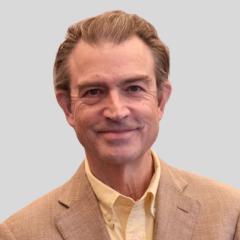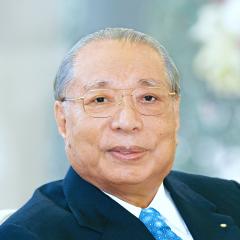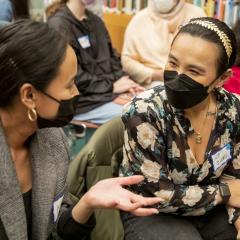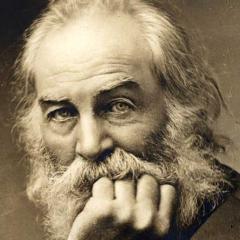Thoughts on Human Revolution
The term “human revolution” is a curious one, suggestive, yes, but also a bit mysterious to those unfamiliar with its meaning within the philosophy of Daisaku Ikeda. For the author of this essay, the Ikeda Center’s Mitch Bogen, the teachings on human revolution situate within the perennial wisdom of always beginning with yourself when it comes to personal and spiritual development, and, further, always beginning with yourself when it comes to matters of social change. Here, Bogen explores that idea and offers other personal reflections and insights on the importance of this orientation.
Thoughts on Human Revolution
To open, let us consider why Mr. Ikeda employs the term human revolution to refer to this vital work. The 20th century, during which Ikeda lived most of his life, was a time of large-scale political and ideological violence. He experienced firsthand the devastating consequences of Japan’s militarist government and culture, which, convinced of its self-righteousness, instigated war across Asia and beyond. It also was an age of violent political revolutions, many of which were Communist in nature, in the Soviet Union, and in China, and in other countries as well. Among the lessons Ikeda drew from witnessing so many atrocities is that we must never accept the willingness of social and political movements, even if we think they are just, to sacrifice and defile countless lives through the employment of an ends-justify-the-means strategy of social change. Human revolution is the means by which the sanctity of the individual becomes nonnegotiable, no matter what our social or macro-level goals are. Ikeda also wanted us not to be distracted by our other, non-political “revolutions,” such as the technological revolution, which he believed would have deleterious effects to the extent that people surrender to technology and fail to focus on the development of their personal awareness and agency. Further, in Ikeda’s view such revolutions will always fall short to the extent they neglect the essential turning within each individual from narrow self-concern to genuine compassion for others.
Why did Daisaku Ikeda feel compelled to proclaim: “A great human revolution in just a single individual will help achieve a change in the destiny of a nation and, further, will enable a change in the destiny of all humankind”? This essay offers some thoughts on that question and other aspects of the crucial endeavor to grow and evolve from the inside out.
1. The problem of projecting your shadow
When I think about this topic, I always begin with the problem of what Carl Jung referred to as the psychological shadow (1), which all of us possess but too infrequently acknowledge or deal with. Most of us have a hunch that there are parts of ourselves, that is, aspects of our modes of thinking, judging, feeling, and being in the world, that strike us as not living up to what we would ideally wish to see. If you choose a response of avoidance, you can bury them and in the process do yourself physical and emotional harm – which indirectly can have negative social impacts. In a more explicit, or outwardly sense, people too often deal with the unpleasant reality of their own shadow by projecting it onto not only other individuals but also other groups of people: national, ethnic, religious, and many, many more. In other words, we blame others not only for our own shortcomings but also for the problems of the world. Among the most horrific cases, of course, is that of the Holocaust, in which the Nazis believed that the total elimination of Jews (and to a lesser degree other groups) would purify society and enable it to achieve a Utopian ideal. And everywhere that racism has manifested, we have witnessed the destructive, dehumanizing impact of the projected shadow. Unfortunately, these are but two of many, many examples. Note that while the “objects” of this violently-projected intolerance and hatred suffer the most, the person or society doing the projecting also puts hard limits on their own ability to advance, develop, and mature. Pursued this way, there will be no Utopia in the offing. For these reasons, it seems to me that addressing one’s own shadow is one of the most primary and fundamental acts of human revolution.
2. Starting with yourself
In my studies of the world’s religious traditions, as well as the teachings of what is called the perennial philosophy, I have found a consistent emphasis on the idea that true spirituality begins with personal experience, realized in both thought and action. Maybe the Buddhist Thich Nhat Hanh said it best: Peace is every step. Or, as Gandhi and many others believed, the way and goal are one. It’s hard for a person who is not at peace with themselves – or let’s say at relative peace – to fully contribute to peace in the world. Of course, one can vote for or contribute to significant, positive causes no matter one’s developmental level. For example, eliminating nuclear weapons is critical, but it in and of itself does not solve the problem of violence, namely the willingness of too many people to treat it as a problem-solving method. As Ikeda often notes, our ultimate goal is to address the substratum of attitudes and behaviors that hinges on the domination of others as the way to achieve one’s goals. It is on this point that the contribution of Martin Luther King Jr and the movement he represented stands in bold relief. I am old enough to have lived when overt racism was not uncommon; when something such as interracial marriage was unthinkable to most people and rank, explicit discrimination of the unjust sort was omnipresent. We can point to the 1964 Civil Rights Act as a landmark in moving us significantly toward legal and governmental equality for “minority” groups. But equally importantly, King and the movement, with their reliance on nonviolence and demonstrable insistence on the spiritual unity of humankind, really did set in motion the changing of the hearts and minds of Americans. I have witnessed this with gratitude. The way the movement went about things caused people to truly look closely at themselves and to see how racism not only insults and harms the lives and dignity of the other but also functions as a spiritual disease that damages the self. In other words, it is widespread human revolution in America that has created the deeper foundation for whatever good we have achieved and might achieve going forward.
3. Action and influence seen in concentric circles
How do we build, and what is the nature of, the path capable of encouraging ever-expanding compassionate and life-giving actions in the world? Or, as Nichiren Buddhists might frame it, what does human revolution as the path to Buddhahood look like? As I reflect on my own experience, as well as what I’ve learned from engaging with the thought of Daisaku Ikeda, I think that among the most fundamental steps to practice is compassion for oneself. Personally speaking, I constantly need to remind myself to cut myself a break just like I would any person that I know. In other words, I don’t expect anybody to be perfect – except myself! Self-compassion helps you and your peacebuilding capacities in two ways. When you are accepting of your mistakes or shortcomings you don’t have the aforementioned need to project them onto others. Avoiding this trap is always a gain for social harmony. The other benefit is that you are developing a strong foundation for being active in the world – that is, you have an accurate sense of yourself as a person among people, one who has both things to offer and things to learn. And it is the dialectic between these realities which makes sustainable growth possible. Growth happens when you avoid both excessive assertiveness and abject passivity. So with this foundation, built on solid rock not shifting sand as the saying goes, you are well-positioned to take action in the world. I recommend conceiving of your actions as manifesting simultaneously in concentric circles. The core realm for working on yourself, beyond the internal work you do to, as the Stoics advise, develop a grounded and productive perspective on yourself and life, is to see what you can do in your main personal relationships to create the kind of world you want to see. It is for this reason that the first chapter of Mr. Ikeda’s dialogue with Elise Boulding, Into Full Flower: Making Peace Cultures Happen (2), is entirely devoted to the family unit as an essential site for peacebuilding. At the same time we also want to act with self-awareness and generosity in our workplaces and community, and to the extent we are able to or desire, in wider social domains. For me, human revolution means always to emphasize – no matter what the form or scale of your engagement with the world is – that which is within your control, for example and not least, how you see and conduct yourself and the degree of respect you show to others. This way you develop a sense of agency and avoid the sense of powerlessness that comes from placing expectations on things that may exist at too remote a distance and are not within your control. Doing so, our ability to close the gap between intent and outcome is greatly enhanced.
The flower is something that brings beauty into the world simply by being itself.
Mitch Bogen
4. A community of realized individuals
When I refer to a community of realized individuals, I don’t mean that everyone in a community focused on personal and social growth will be what we might call enlightened or even anywhere in the vicinity of human perfection. That’s asking a lot and it’s not going to happen! Instead, we should understand, as Buddhists do, that human revolution is a daily task of human becoming, with no end point or final state of perfection. Nevertheless, I think we do want to see levels of human revolution that would make individuals resistant to authoritarian group-think, especially insofar as they reject us-versus-them thinking and, again, the propensity to project one’s shadow or shortcomings onto those groups identified as “other.” Here, in this enabling of resistance to authoritarian or totalitarian systems, we encounter one of the prime reasons for human revolution as expressed by Daisaku Ikeda’s mentor, Josei Toda. It was his view that too many people of his time either willingly or blindly went along with the militaristic imperial government of Japan in the years before WWII; it was their lack of self-realization that allowed so many atrocities to happen. Toda even argued that human revolution is critical to achieve nuclear disarmament, perhaps the most macro-level issue there is. (3) One of the main principles that enables a necessary level of realization for both individuals and groups is what the philosopher and theorist Ken Wilber calls “transcend and include.” (4) Simply put, as one grows in consciousness, awareness, and desire for creative coexistence, one must take care not to “throw the baby out with the bathwater” and leave behind whatever may have been good about one’s previous, less inclusive, levels of development. This principle was central to the philosophy and approach of Civil Rights Movement, as articulated by Martin Luther King, Jr., and was a key to their success. Thoroughly Christian in character, it set aside (or transcended) those aspects that historically set the faith in opposition to others who were defined as unbelievers and sinners, but carried through (or included) those aspects that emphasized ideals such as nonviolence and universal brotherhood. Further, in rejecting what is known as exclusivism, it embraced pluralism, acknowledging debts to the philosophies of non-Christian figures such as Thoreau and Gandhi. Thus, with Christianity it spoke a language and was built on a traditional foundation that was ancient and formative to Western civilization. People could relate to and believe in it. Yet it also was flexible enough to build pragmatic coalitions in pursuit of racial justice and true democracy. (5)
5. Contributing your best self
In the famous Flower Sermon of the Buddha he wordlessly holds up a flower, sometimes identified as a white lotus blossom, and says no more. All the disciples present are baffled except one, Mahakasyapa, who smiles. The lesson from the Zen perspective is that this smile indicates that the transmission of insight into the indescribable nature of existence is something that happens directly and silently, without explanatory words. I accept this interpretation, yet I always want to take it a step further and consider the meaning of the flower itself. For me, the flower is something that brings beauty into the world simply by being itself. Human revolution, then, is how each of us comes to know ourselves well enough to understand how we can contribute to the world in our most natural and therefore most effective way. Knowing oneself means to pay attention to where your passion, joy, and sustenance derive from as well as what your limitations are, that is, the ways you either can’t or don’t want to be “all things to all people.” The importance of this can’t be overstated. Without self-knowledge, your attempted social contributions will be missing the “juice” that brings power, and instead might come across as insincere or dutiful, which inspires no one and can also impair your self-belief. It often feels, at least in my milieu, like the default assumption is that the most important social contribution comes in the form of political activism. But that’s narrow thinking. First of all, the very nature of activism requires the simplification – sometimes even over-simplification – of message and argumentation. This is fine and good, as the results of said activism have the potential of being socially beneficial, necessary even. But those of us who work in education-related fields, to cite just one example, are often trying to do something else, at what I see as a deeper level with longer term objectives. Essentially education helps people do three things, all of which relate to human revolution: understand the world we live in, understand themselves in relationship to the world, and develop the knowledge and skills to both succeed in the world and contribute positively to it. The ways of doing these are as numerous as there are individuals in the world.
6. Social self-actualization
Human revolution is an individual phenomenon, yet it cannot successfully be done in isolation. It is only in the company of others that we can see the evidence of our choices. Do our philosophies of life, our assumptions about others, and the ways we choose to act serve to create harmony or division? Do they help us succeed or leave us frustrated? And further, do they help us succeed in ways that build up rather than diminish others? In the safety and seclusion of our heads we might have imagined affirmative responses to these and other such questions only to discover differently in contact with others. Jim Garrison, professor of education at Virginia Tech and a good friend of the Ikeda Center, calls this manner of discovering ourselves “social self-actualization.” (6) This also illustrates the Nichiren Buddhist principle of the “oneness of life and its environment.” Your surroundings are a mirror for your inner life state, and will reveal things that you might try to hide from yourself. Put differently, “… Everything is perceived through the self and alters according to the individual’s inner state of life. Thus, if we change ourselves, our circumstances will inevitably change also.” (7) Here we should note an additional complexity offered by Ikeda dialogue partner the historian Vincent Harding, which is that as we effect change in our environments, both individually and collectively, we in turn are ourselves changed. Citing the Montgomery Bus Boycott as the paradigmatic example of this dynamic, he said that personal and socio-political change are “constantly moving, dialectical activities — as we challenge institutions we discover new resources in ourselves, and as we discover these new resources, we are able to mount more effective challenges.”(8) Ultimately, though human revolution is intensely personal, it can’t succeed if one sees oneself as an atomized individual. We do best when we understand that while our independence is quite real – we do have agency and choice – it always manifests in a context of interdependence.
7. An inner compass is essential
Daisaku Ikeda always insists that happiness is the goal of religious practice, and by extension, life itself. It seems to me that, given the way the world is trending, without human revolution, characterized by self-awareness and conscious intent, happiness is something that will become increasingly elusive. That is, our most dominant forces, such as social media, “remote” learning and gathering, and artificial intelligence, take us outside ourselves into realms where “reality” becomes a slippery proposition. Indeed, it is said to be “virtual.” It was Emerson who said, “In the woods, we return to reason and faith,” (9) and I think his insight is even more relevant today. The way I interpret him is that nature is a realm not created by humans (influenced, yes, but not created) and all its processes fundamentally make sense. Things happen for a reason and there is no malicious intent. And what is more, it is the source of all nourishment. Thus, it gives you a baseline understanding of life that is distinctly non-neurotic. I would say that in many ways the same relationship now holds between the world of human relations and the world online. The nourishment we get from those we are truly in physical relation with is essential. Ultimately, however, the human revolution we need going forward is the same regardless of whether we are online and off. What we need is to have a solid sense of ourselves, which is what provides the inner compass that can help you stay the course whether you are either getting flamed or excessively liked. First, we need to understand our values. One thing I have appreciated as part of the Ikeda Center is that, as an organization informed by Buddhist ideals, our values and guiding principles are clear and time-tested, which is helpful at a time of harshly contested moral and political agendas. We also need to understand what we value. What do we want to get out of our relationships and pursuits? What do we care about in the deepest sense? Finally, what do we want to achieve? The Stoic philosopher Seneca was right when he said that no wind favors the ship that has no port of destination. We can navigate the noisy storm of “information” besieging our lives better when we understand our own objectives as opposed to the ones others may think we should have.
Conclusion: The Mentor and the Disciple
As I was writing this piece and explicating the core aspects of human revolution as I see them I kept thinking that the unspoken throughline is the centrality of the mentor-disciple relationship in the worldview of Daisaku Ikeda. Just as we need our social environments to be able to truly see ourselves, we also benefit from having specific people in our lives who not only can help us perceive those areas where we can improve but also, and perhaps more importantly, help us to see how great our true potential is. After all, most of us undersell ourselves, right? And now, as I think it through even further, it seems one cannot truly be said to have achieved their own human revolution until one has helped another to achieve theirs. And not only that, in Mr. Ikeda’s view, the mentor has only succeeded when the disciple surpasses them in wisdom, self-belief, and compassion. In this way, human revolution truly helps to achieve a change in the “destiny of humankind.”
Notes
1. For an excellent overview of Jung’s thinking on this topic, see “The Shadow,” by Christopher Perry.
2. Published by Dialogue Path Press in 2010.
3. Daisaku Ikeda discusses here why individual strength and wisdom are the antidote to militarism for Toda. Clark Strand discusses here the role of human revolution in Toda’s call for nuclear weapons abolition.
4. For more on Ken Wilber’s principle of transcend and include as well as a general introduction to his philosophy, see The Essential Ken Wilber: An Introductory Reader (Shambhala Publications, 1998)
5. For more on King’s philosophy of social change see his three books on the Movement: Stride Toward Freedom (Beacon, 1958), Why We Can’t Wait (Beacon, 1964), and Where Do We Go From Here: Chaos or Community (Beacon, 1967).
6. For more on Garrison’s thoughts on social self-actualization see the report from the 2009 Ikeda Forum: “John Dewey, Daisaku Ikeda, and the Quest for a New Humanism.”
7. From the essay “The Oneness of Life and Its Environment” at sokaglobal.org.
8. From the Ikeda Center interview with Dr. Harding called “Nonviolent Change of Revolutionary Depth.”
9. From Emerson’s book Nature (1836).




